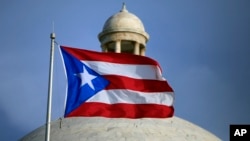The government of Puerto Rico has confirmed that it failed to make a $58 million debt payment that was due Saturday, a move that amounted to a default for the first time in its 117 years as a United States possession.
Puerto Rican officials had warned on Friday that they would not make the payment because the island legislature failed to appropriate the funds, but they argued it should not be considered a default.
But Moody's Investor Service said Monday the missed payment was the first in what it believes will be broad defaults on commonwealth debt.
The territory did make a payment on the interest of about $628,000, saying it lacked the funds to pay the amount in full.
Puerto Rico Governor Alejandro Garcia Padilla shocked investors in June when he said the island's debt, totaling $72 billion, was unpayable and required restructuring. This includes debts, owed not just by the central government, but also those of public corporations, like utility companies, and cities.
Puerto Rico is the third largest issuer of state and local debt in the United States, behind only California and New York.
Much of the island's debt is held by individual U.S. investors in hedge funds, mutual funds or other investment accounts raising questions about how the U.S. economy might be affected now that Puerto Rico has fallen behind on its debt payments.
No Bankruptcy Protection
Puerto Rico has no bankruptcy protection, the ability to restructure in order to pay off debt. Bankruptcy is open to state municipalities – the city of Detroit filed for bankruptcy in 2013 – but not to territories.
Two weeks ago, U.S. senators Richard Blumenthal and Charles Schumer introduced a bill that would grant Puerto Rico the authority "to allow its municipalities and public utilities to readjust their debts under the supervision of a bankruptcy court."
“This measure is vital to prevent a humanitarian and financial catastrophe – a clearly avoidable disaster,” said Blumenthal at the time.
He added that "creditors, investors, ordinary citizens" would be harmed if the measure were not passed.
“We can either do the right thing and give Puerto Rico the bankruptcy option it needs and deserves, or we can risk a disaster on the island and billions in bailout payments later,” Schumer said.
Chronic Economic Woes
Economic troubles in Puerto Rico are not new.
The territory has been in recession since 2005 when the U.S. Congress ended a tax credit designed to attract businesses to Puerto Rico. Since then, the territory has borrowed to stay afloat.
“Puerto Rico’s illness is a chronic condition.” Puerto Rican congressional representative, Pedro Pierluisi, wrote in The New York Times recently. “The unemployment rate, poverty rate and median household income have always been far worse than any state’s. The main cause is inequality.”
Pierluisi was making the case that Puerto Rico’s status as a territory, rather than a state, has led to second class treatment. Residents of Puerto Rico cannot elect the president or senators, and Pierluisi, himself, is a non-voting member of the House of Representatives.
"It is little wonder then that Puerto Rico is in recession, has excessive debt and is bleeding population," he said. "Unequal treatment at the federal level, combined with mismanagement at the local level, has a debilitating effect on the island's economy."
